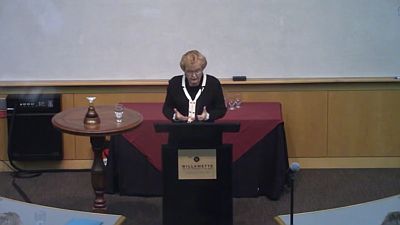When he was in first grade, Barbara Roberts’ son, Mike, was sent home with a letter saying he was not to return to school. There was no place for him.
In a time when no laws protected people with physical or mental disabilities, Mike was seen as “severely emotionally disturbed,” and Roberts was instructed to put him into permanent institutionalization. Today, his condition is known as autism.
“My little boy was a throw-away,” Roberts says. “I began to speak out about this invisible discrimination. I pleaded for help; I sought a hero.”
Roberts told this story in her lecture, “Finding a Place: The Trials and Triumphs of the Displaced,” on Jan. 19 at the Willamette University College of Law. The speech was part of the “Life Inter-rupted” events, celebrating Martin Luther King Jr.
A Mother’s Anger
The former Oregon governor’s personal story was deeply tied with King, as they both championed for equal rights. King fought for racial equality; Roberts fought for the rights of children with disabilities.
“At the very same time in American history, Martin Luther King was leading the movement for African-American equality,” she says. “I cheered his work and applauded his bravery, and then I continued my search for a leader to champion the causes for children with disabilities.”
By the end of the 1960s, Roberts was a divorced mother with two sons, no child support and a low-paying office job. But she says she was unwilling to let these liabilities shortchange her oldest son any longer.
“I had two crucial assets: a cause and a mother’s anger,” Roberts says. “If I could not find the leader I sought, I would assume the position by self-appointment.”
She took a day a week off from work and become an advocate for social change, an activist for equality. Five months later, Senate Bill 699 was signed into law. It was the first special education law of its kind in the nation.
“I had moved the mountain of government. I had taken on the challenge of creating change and, against all odds, I had made it happen,” she says. “I had learned that one person can make a difference in the political process. My son’s educational rights were now the law. His needs and our cause were no longer invisible.”
Impacting Change
During the next decade, Roberts says her eyes were opened to other areas of discrimination often hidden in the shadows of our culture.
Having seen these injustices, Roberts dedicated her life’s work to impacting change — not just for her own children, but also for sons and daughters across the country.
Willamette undergraduate Niko Morozov ’18 says Roberts’ compassion and dedication to these issues are compelling and moving.
“It was inspiring to hear from someone so knowledgeable about new social issues and challenging social norms,” she says.
Through her work for LGBT rights, gender equality, fair housing and more, Roberts became an advocate, ally and the only female governor in Oregon history — serving from 1991-95. Roberts says it is crucial for her to fight against injustices, whether they directly affect her or not.
“For me to remain silent because I am not personally impacted is for me to accept hatred and discrimination; for me to condone bigotry and pain; for me to excuse dignity and inequality," she says. "It is not a matter of political or personal courage. For me, it is simply a matter of conscience.”
Infinite Hope
Throughout her career, Roberts has fought for all to have a space and to be treated fairly and with dignity.
During her time in office as governor and during a term as secretary of state, she used her voice and position to appoint 54 judges to the bench — including Oregon’s first two Latino judges, Oregon’s first Chinese-American judge, five openly gay and lesbian judges, and the most women ever appointed to the bench in Oregon.
In addition, while she was governor, more than 800 women and 300 people of color became active participants on Oregon’s citizen policy boards and commissions.
Though faced with daily challenges, Roberts says the fight for equality will and must continue.
“We must accept finite disappointments,” Roberts says, quoting King. “But we must never lose infinite hope.”
• Article by Natalie Pate ’15, politics and French and Francophone Studies major

